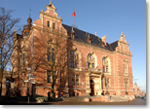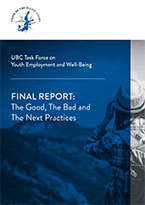Secretariat
Wały Jagiellońskie 1
80-853 Gdańsk Poland
tel. +48 58 301 09 17
tel. +48 58 301 91 23
fax +48 58 301 76 37
 Contact us
Contact us


Conference statements
Statement by Mr Anders Engström at the CBSS meeting
Brussels February 8th 2000
Mr Chairman, dear friends,
UBC is still growing, both in terms of members and in terms of activities and contacts. We almost reached 100 member cities the last year, and new members are still coming. Our activities are expanding as well, and it is not possible to give a full overview of them in a short time.
This is a reflection of the very wide range of activities in a city government. The daily educational, social, environmental, technical and cultural activities involve virtually all citizens of the city. The city must also secure the wellbeing not only for the present citizens, but also for coming generations, so the cities must have activities to secure a sustainable development, for example urban and spatial planning and strategic development.
The wide variety of the activities of our member cities reflects the wide variety of the activities of UBC. Most of the concrete activities are carried out in our nine Commissions, of which several also have their own secretariats with own staff.
However, in our work we are aiming at having all our activities being influenced by four factors. We would like all the UBC activities to:
- take into account a sustainable development, that is to be guided by the principles of Agenda 21
- as far as possible have the EU enlargement as an important aim or background for the activities
- investigate how the influence of young persons can be secured or taken into account
- contribute to gender equality
A need for a Baltic Sea Program
At the Oslo-meeting in December, I stated that one main problem for co-operation on subnational level between east and west in the BSR is the lack of funding opportunities for multinational projects on sub-national level. BSSSC stated the same as a main result of their consultation process. You can find bilateral funding, especially in Sweden, and we have the Nordic Council of Ministers. But there is nothing in the EU Commission except a small Article 10-initiative, Swebaltcop.
The need is great, especially in the light of the many programs in this field that were open until 1998. In the autumn of 1998 there was a period when there were five deadlines for different programs on local and regional co-operation between east and west within six months. This created an understanding of the benefits of such co-operation, which makes the present total lack of opportunities even more complicated.
There are now, however, some initiatives which might help the situation in a few years time.
First we have heard of the Danish initiative earlier today. UBC supports it indeed and I hope for success.
The planned Interreg III is hopefully on its way. I welcome it of course, but it has several drawbacks as it is now. The main part of the program, the so called Strand A which has 50 - 80 % of the total Interreg III funding, is for example only of minor interest for east-west co-operation in the Baltic Sea region since it punishes maritime borders. My city, Kalmar, has extensive transborder co-operation across the Baltic Sea with our Lithuanian and Polish neighbours, but we cannot utilise the program since maritime borders are not eligible.
However, UBC has formed a special working group with the aim of preparing a program on local and regional co-operation, to be financed from Interreg III Strand B. We have invited the new BSSSC secretariat in Gdańsk to participate, so it will hopefully be a joint UBC-BSSSC initiative. We need of course support also from CBSS in this matter.
Apart from these initiatives, Eurocities and the Berlin and Hessen Offices in Brussels have initiated a process to create a program for co-operation between local and regional level in EU and the accession countries, to be financed from the Phare Institution Building program. One difference is that it will cover the whole of Europe and not only the Baltic Sea Region as our initiative does. Both models are needed. UBC has been invited to participate in the process, and we are of course supporting it.
These three initiatives need strong support from all friends of the Baltic Sea Region, including CBSS, the governments in the accession countries, and representatives in the European Institutions. I do hope we can count on you.
Problems with Phare financing.
There is a problem with all programs dealing with east-west co-operation, and that is financing of the participation of the eastern partners, which should come from Phare. We in the western countries sometimes think that the eastern governments do not prioritise Phare support to projects dealing with local and regional co-operation, because it tends to be so difficult to co-ordinate Phare with other EU funding.
One reason is of course the construction of Phare which leads to a situation where you have to co-ordinate the governments in four countries, if we restrict us to the Baltic Sea Region only, and that is difficult.
Another problem was told us during a seminar on cross-border projects at the Estonian Ministry of interior where UBC participated. When we brought up this problem, the estonians told us they actually are in favour of prioritising Phare funding for local and regional co-operation projects, but a delegation from Phare had told them that Estonia should concentrate on large Phare projects, minimum 2 million Euro. That is mostly too much for a project for local and regional co-operation projects - you can bring half the population of Tallinn on the ferries to Helsinki for that money, including champagne.
I do think there is some system error here. There is a need for awareness raising both in the ministries of the accession countries to prioritise Phare financing for local and regional co-operation projects, as well as in the EU Commission to promote the possibility to finance local and regional co-operation programs through the Phare system. Also, if you move managing as well as decision making out from Brussels to be carried out locally in the Baltic Sea Region, you also solve the problem of handling many small projects in the EU administration.
Conclusions
To sum up, both UBC and BSSSC have stressed the need for EU programs on co-operation between local and regional authorities. We have started to work on this issue, and if everybody is working in the same direction, we can hopefully one day again be able to work together in EU financed projects on local and regional co-operation. This will undoubtedly make the accession process easier.
Thank you!




